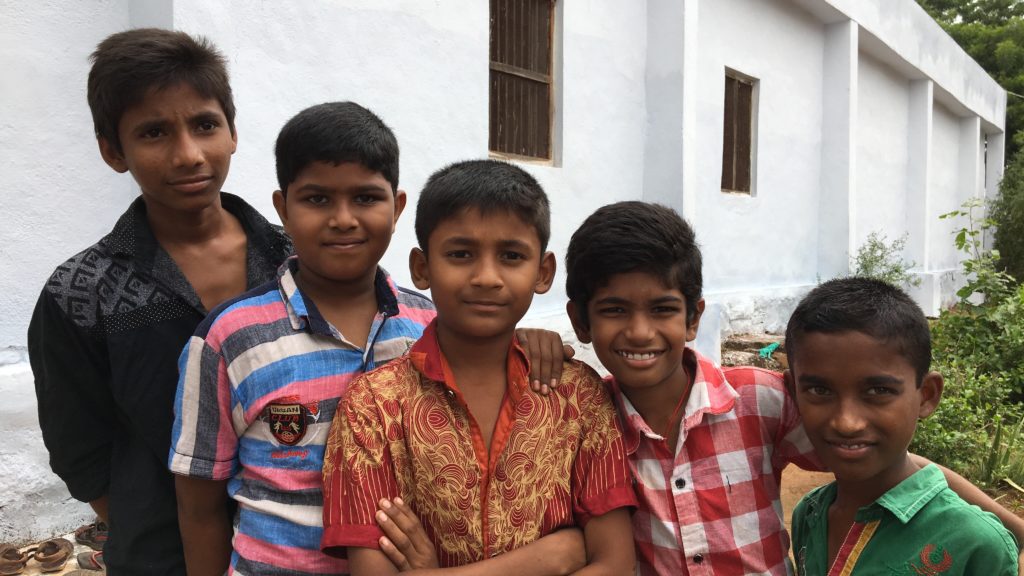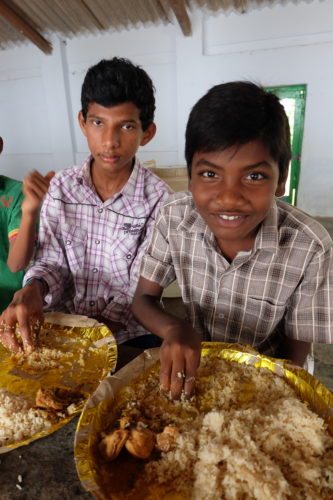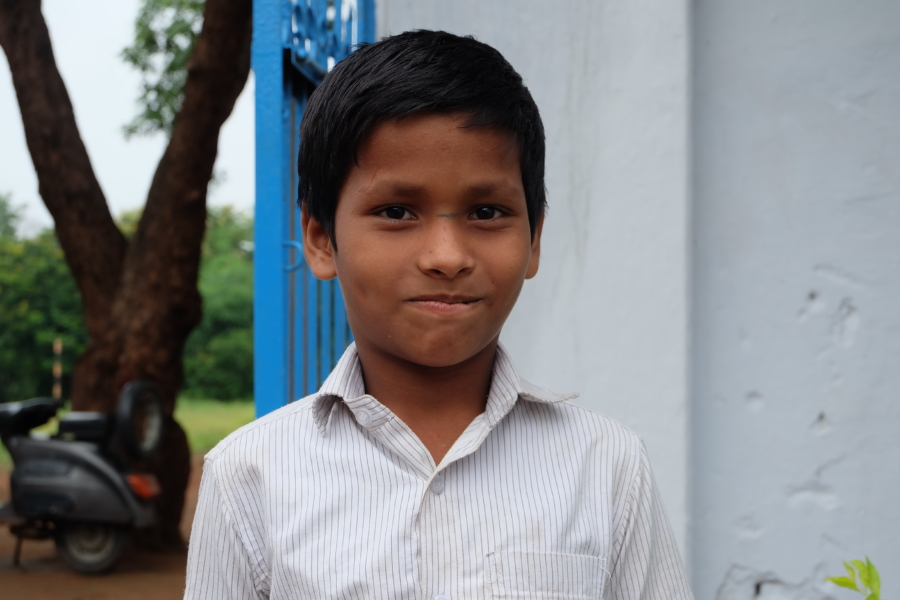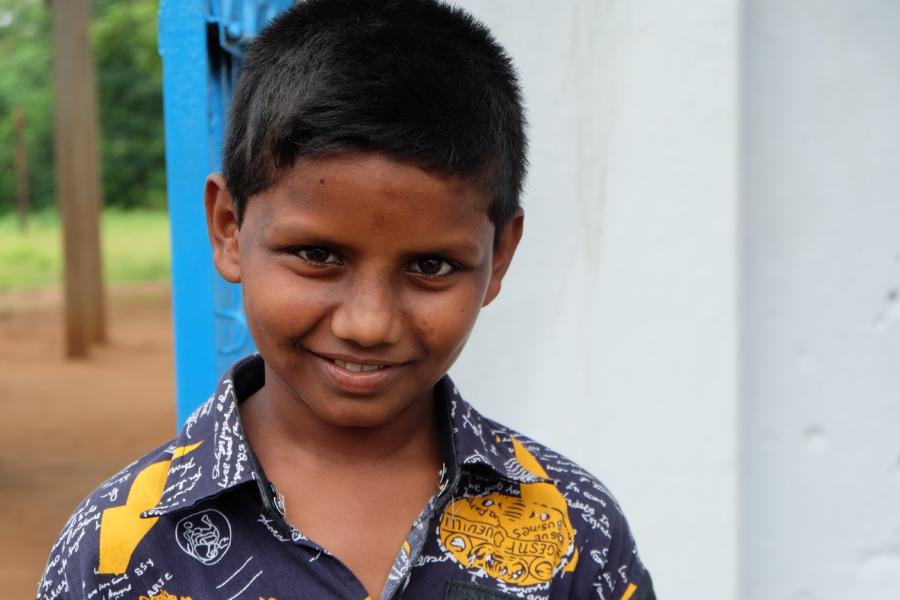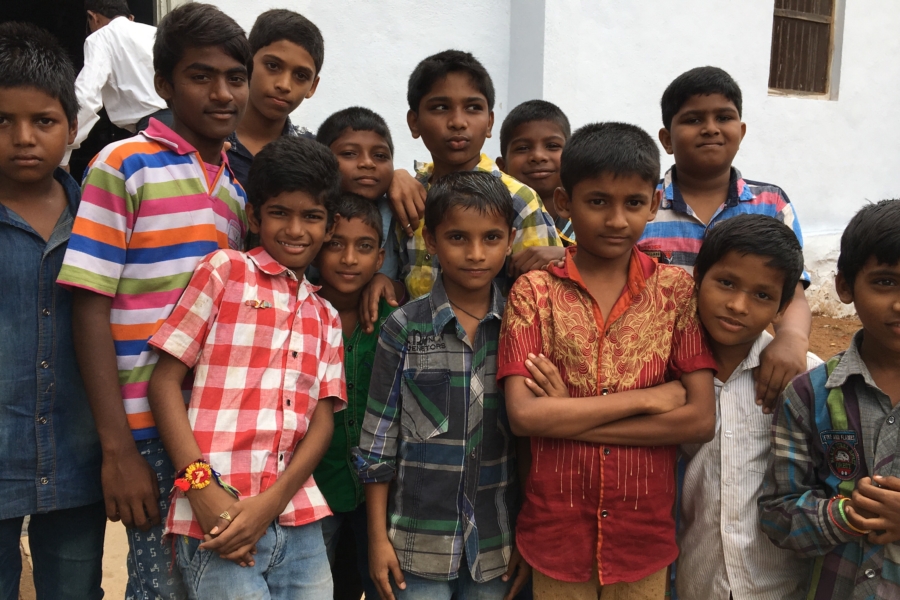After spending a long day visiting two projects outside of Hyderabad, Luis Bourdet, our Director of International Programs, and I prepared to travel even further into India’s rural landscape to a small town called Dornakal, in the state of Telangana, where we would be visiting six more homes. Before we left, Luis had explained to me that our projects in Dornakal are nestled in a cathedral compound run by the Diocese of Dornakal, which is a sector of the Church of South India, the largest Protestant denomination in the country.
We were picked up early in the morning by a young priest, Reverend Pratap, with whom Luis had worked on his last trip to India three years prior. A few hours later, when we arrived at the Dornakal Diocese Compound, we were greeted at the bishop’s home by the bishop himself, Reverend Doctor Prasada Rao, and our volunteer coordinators, as well as many of our sponsored children.
Three of our affiliated projects, established more than thirty years ago by our founder, Mrs. Jeanne Clarke Wood, are in walking distance to one another, within the walls of the compound. As Luis and I met with the bishop and our coordinators, we were looking very forward to visiting each project over the course of the next three days.
In remembrance of J. Calvitt Clarke
After the coordinators left, we sat down to lunch with the bishop. Reverend Doctor Prasada Rao has been affiliated with the Diocese of Dornakal for three years, and he explained to us that in that time, he has seen the cost of food and boarding for the children rise; but unfortunately, the Church has not received any additional funding from outside sources. For now, he relies on donations from the congregation and support from Children Incorporated sponsors and donors to ensure that the children have a safe place to live, food to eat, and that they are able to attend school. As I have seen so many times before with our work around the world, without sponsorship, these children would not have the opportunity to go to school.
After eating, Luis and I, along with Reverend Pratap, took a short walk across a large, empty field to the J. Calvitt Clarke Home — named after Mrs. Wood’s father, a Presbyterian Minister who started working with impoverished children in 1938, when he founded China’s Children Fund to aid Chinese children displaced by the Second Sino-Japanese War. Because the mission had expanded to other countries, the name of the organization was changed on February 6, 1951 to Christian Children’s Fund, and then later to ChildFund International, a name which the organization still uses today.
As we approached the home, I thought about how amazing it is that Mrs. Wood had so long ago taken such a great interest in her father’s humanitarian work that she started her own organization. It was special to see Children Incorporated’s history honored in such a way in India. It was in 1964 that Mrs. Wood visited Guatemala for the first time, and witnessed the deprivation of children there. When she returned home, she wanted to do something to help.
Mr. Samuels said that he wishes there were funding to enroll more children in the home, too, because the needs of children in and around Dornakal are so great.
Out of her home in Richmond, Virginia, she established Children Incorporated and wrote letters to friends, family, and acquaintances asking for support for the 95 children she had met during her travels. Those children comprised our first affiliated project; and today, Children Incorporated supports over 300 projects in 23 countries. I can’t help but think that Mrs. Wood, who had great admiration for her father, named this project after him as a thank-you for having lead a life of example, so that she herself could go on to do her own work to help hundreds of thousands of children all over the world.
Monkey trouble
When we arrived at the home, Mr. Samuels, our Volunteer Coordinator, was waiting for us. A tall, thin Indian man with a full gray mustache and glasses, Mr. Samuels has been at the J. Calvitt Clarke Home since the 1970s. Today, 34 boys who come from incredibly poor families that cannot afford to take care of them, let alone send them to school, live at the home. Fortunately, all of them are currently enrolled in our program; they attend local schools where they study math, science, social studies, and their regional language, Telugu.
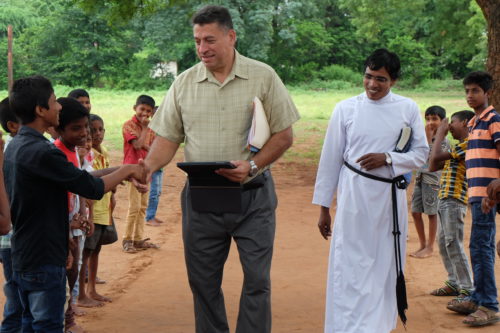
Luis Bourdet and Reverend Pratap greeting boys outside the J. Calvitt Clarke Home
As we toured the home, Luis told me that in the last ten years, Children Incorporated has built a dorm for the boys, as well as purchased cots and mattresses for them to sleep on. The home has a dining hall and study room, and there is a lot of land for the boys to play on in the afternoons. Mr. Samuels told us that there is a small clinic nearby where a nurse treats the children when they fall ill, mostly of illnesses like typhoid, due to a lack of clean drinking water or because of contaminated food.
As we continued talking with Mr. Samuels, we discussed the obstacles he faces as an administrator. He indicated that he is mostly concerned about a lack of funding for improvements to buildings on the compound. Other than the recently-constructed dorm, an undertaking that was facilitated by Children Incorporated supporters, there are cracks in the walls and ceilings of the other buildings on the property, which were built as many as forty years ago.
Mr. Samuels said that he wishes there were funding to enroll more children in the home, too, because the needs of children in and around Dornakal are so great. There are many poor families who make very little money farming, and that cannot afford to feed their children or send them to school. The home has empty beds, but Mr. Samuels doesn’t have the additional money required to fill them.
As I have seen so many times before with our work around the world, without sponsorship, these children would not have the opportunity to go to school.
In an effort to offer a solution to the problem, Luis asked Mr. Samuels why he doesn’t grow food for the children. It was obvious to Luis and I both that there is ample land on the compound property that isn’t being utilized. Mr. Samuels answered with one word: monkeys. Although seemingly harmless to some foreigners, for the locals, monkeys are pests. They roam the compound freely, in large packs, eating everything they find, making it impossible to grow crops or even have fruit trees from which to gather food. Mr. Samuels said that they are only able to grow tea plants, but not enough to sell to generate income.
As we left the project and walked back to the bishop’s home, I watched the mischievous monkeys climb around in the trees, and I thought about how even with the challenges that this project faces today, Mr. Clarke would be so proud of his daughter. I don’t know if he ever visited the J. Calvitt Clarke Home in India, but from what I saw, thanks to the support of our sponsors, donors, and Mr. Samuels, the home is doing amazing work to help poor children in India — children who, without the vision of people like Mr. Clarke and Mrs. Wood, would not otherwise have the opportunity to receive an education.
***
HOW DO I SPONSOR A CHILD IN INDIA?
You can sponsor a child in India in one of three ways: call our office at 1-800-538-5381 and speak with one of our staff members; email us at sponsorship@children-inc.org; or go online to our donation portal, create an account, and search for a child in India that is available for sponsorship.

